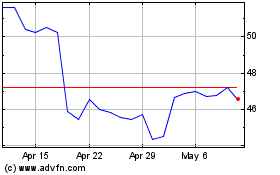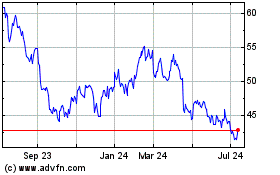Sands to Pay $6.96 Million to Settle U.S. Investigation
January 20 2017 - 1:24AM
Dow Jones News
By Chris Kirkham and Alexandra Berzon
Casino giant Las Vegas Sands Corp. agreed Thursday to pay a
$6.96 million criminal penalty to settle a U.S. Justice Department
investigation into violations of the antibribery law over payments
the company made to a business consultant in China.
The DOJ didn't accuse Sands of paying bribes but said it
violated provisions of the law that require companies to maintain
proper controls.
The agreement closes a long-running episode that entangled the
company in state and federal investigations, and cost it tens of
millions of dollars.
Ron Reese, a Sands spokesman, said the company is "pleased that
its cooperation and long-term commitment to compliance were
recognized in reaching this resolution. We are equally pleased that
all inquiries related to these issues have now been completely
resolved."
As part of the nonprosecution agreement with the Justice
Department, the company admitted it paid approximately $5.8 million
to the consultant, a former Chinese government official, between
2006 and 2009 even though there was no "discernible legitimate
business purpose."
The gambling company, controlled by Republican donor Sheldon
Adelson, also acknowledged it failed to monitor and account for
those payments.
Separately, Sands last year paid $9 million to settle a U.S.
Securities and Exchange Commission investigation into similar
dealings with the same business consultant. The consultant was
involved in helping secure the company's sponsorship of a Chinese
basketball team and securing an office building in Beijing, along
with other business ventures.
Sands also settled a related matter last year with the Nevada
gambling regulators, paying $2 million to the state. A.G. Burnett,
chairman of the Nevada Gaming Control Board, said the agency will
review the DOJ settlement.
The DOJ's investigation originated from statements made in a
wrongful-termination lawsuit from a former Macau executive. The
executive alleged in the lawsuit that began more than six years ago
that the company was engaging in improprieties in Macau, the
Chinese gambling hub.
The company settled the wrongful termination case with that
employee last year for more than $75 million.
The Wall Street Journal first reported on the deals criticized
by the DOJ in a 2012 article. The company first said in SEC filings
in 2013 that an internal board review had showed it likely had
violated accounting provisions of the Foreign Corrupt Practices
Act, the law that bans bribery of foreign officials, because it
didn't have proper accounting controls related to the deals.
As part of the agreement, federal officials said Sands will
continue cooperating with the DOJ in any ongoing investigations or
prosecutions related to the business dealings and will continue to
update the DOJ on its compliance efforts.
In a DOJ document released Thursday, the agency said the
nonprosecution agreement doesn't apply to any of the individuals
involved in the case.
Part of the questionable payments stemmed from a deal involving
the purchase of a Chinese basketball team. In 2007, Sands was
interested in purchasing a team as a way to promote its operations
in Macau, but learned it was unable to do so under league rules
because it is a gambling company, according to DOJ documents. The
company arranged to pay the consultant to buy the team, but
employees started to notice irregularities into how the money was
being accounted for, according to the DOJ.
The company brought in an accounting firm to investigate the
payments, but encountered resistance from the consultant and an
executive of its Macau subsidiary, according to the DOJ.
By the time the accounting firm was told to complete its
investigation in early 2008, the firm still couldn't account for
$700,000 in payments to the consultant, according to DOJ documents
outlining the agreement.
In a separate transaction, companies controlled by Sands wired
$3.6 million to one of the consultant's companies as prepayment on
a building lease in Beijing, even though the consultant provided no
documentation to support that he had purchased the building,
according to the agreement.
When an outside lawyer and a Sands finance employee raised
concerns about the irregularities, a Sands executive in China had
them removed and replaced with less-experienced employees,
according to the agreement.
The DOJ said Sands no longer employs any of those involved in
the investigation and credited the company with completing
"extensive remedial measures," including an expansion of its
compliance and auditing departments.
Write to Chris Kirkham at chris.kirkham@wsj.com and Alexandra
Berzon at alexandra.berzon@wsj.com
(END) Dow Jones Newswires
January 20, 2017 01:09 ET (06:09 GMT)
Copyright (c) 2017 Dow Jones & Company, Inc.
Las Vegas Sands (NYSE:LVS)
Historical Stock Chart
From Mar 2024 to Apr 2024

Las Vegas Sands (NYSE:LVS)
Historical Stock Chart
From Apr 2023 to Apr 2024
